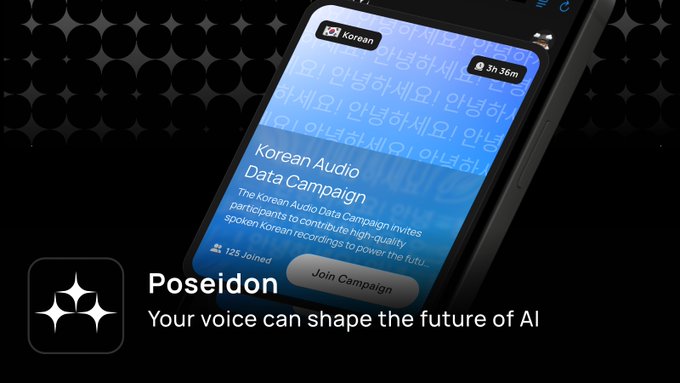AI has already become inseparable from our daily lives through translation services, smart speakers, customer service chatbots, and even autonomous vehicles. Yet one critical question remains unresolved: “Can AI truly understand human voices and behaviors?”
Until now, most AI systems have only recognized language at a mechanical level, failing to fully account for nuances such as intonation, emotion, regional dialects, and noisy environments. As a result, user experience remains limited, and natural communication with humans still feels out of reach.
PoseidonAI was created to solve this problem. Its mission goes beyond recognizing speech; it aims to build a new data infrastructure that transparently collects real-world data, secures ownership on-chain, and returns rights to the actual contributors.
- AI still struggles with intonation, emotion, and background noise
- Data scarcity and opaque ownership remain serious challenges
- PoseidonAI = an integrated platform for data collection, management, and rewards

Why Poseidon?
Large language models (LLMs) such as ChatGPT, Claude, and Gemini are growing more sophisticated every year. However, their performance ultimately depends on the volume and quality of training data. The problem is that high-quality data is running short. Existing large-scale text and image datasets are already saturated, and acquiring new ones is becoming increasingly difficult—a challenge the industry calls the “Data Drought.”
PoseidonAI directly addresses this bottleneck. Rather than simply gathering data, it builds an infrastructure where data can be used safely and legally, with intellectual property rights (IP) protected on-chain.
- PoseidonAI = a new path with IP-safe data infrastructure
- LLM competition intensifies, but quality data remains scarce
- Text and image datasets have reached their limits
The Role of Blockchain
In traditional Web2 platforms, even if users provide the data, ownership ends up belonging to the company. Contributors receive little recognition or compensation. This opaque structure often leads to copyright disputes and erodes user trust. PoseidonAI solves this problem with blockchain.
Every dataset is registered on-chain, ensuring transparency and traceability, while contributors retain clear ownership. In effect, the data provided by users is no longer just raw input—it becomes a unique digital asset, managed like an NFT. This transforms data from a raw resource into something that carries rights and rewards for its contributors.
- Web2: Data monopolized by corporations, no user rights
- Web3: On-chain records secure contributor ownership
- Data = digital assets, traceable and rewardable like NFTs
Physical AI and Multimodal Data
PoseidonAI is not limited to text or images. The future of AI depends on how well it can interact with the physical world. Autonomous cars, for example, require video and driving data, while robots operating at home must learn from voice commands, human gestures, and environmental context.
To meet these needs, PoseidonAI embraces multimodal data collection. It manages voice, video, and behavioral datasets within a single integrated platform—something that sets it apart from traditional data companies.
- Autonomous driving: requires video and driving datasets
- Robotics: needs speech, behavioral, and environmental data
- Poseidon strategy: multimodal datasets combining voice + video + actions
Core Features
PoseidonAI provides a full-stack data management solution, covering the entire pipeline from collection to licensing.
- Licensing tools: Enterprises can purchase and utilize datasets legally and transparently
- Mobile SDK & DePIN app: Tools for users to directly contribute data
- Automated preprocessing + human validation: Algorithmic labeling combined with expert review ensures quality
- On-chain IP registration: All data recorded on blockchain for ownership protection
- Licensing tools: Enterprises can purchase and utilize datasets legally and transparently
Turning Data into Assets
PoseidonAI reframes voice data as an economic asset rather than a disposable resource. Users who provide audio samples through the app earn points, which can be converted into cash or exchanged for partner rewards. The curated datasets are then used by enterprises and institutions for AI training, creating value for both contributors and consumers. This establishes a sustainable feedback loop where individuals and organizations benefit equally.
- Users: provide voice data → earn points
- Rewards: cash-out or partner benefits
- Enterprises: gain high-quality datasets → improve AI training
- Ecosystem: win-win structure for both individuals and organizations
Investment and Credibility
PoseidonAI is more than just an idea—it has already earned the trust of global investors. In the summer of 2025, it successfully closed a $15 million seed round led by a16z Crypto. This validates Poseidon’s potential to become a critical piece of infrastructure at the intersection of AI and blockchain.
- Funding raised: $15 million (Seed)
- Lead investor: a16z Crypto
- Use of funds: Expanding Contributor modules, releasing SDKs, strengthening global onboarding
Differentiation from Competitors
Companies like Deepgram or Lovo operate under the Web2 model, where corporations own the rights to collected data. PoseidonAI flips this paradigm with data sovereignty—ensuring that rights and rewards stay with contributors.
- Web2: Data rights monopolized by corporations
- Web3: Data rights centered on contributors
- Outcome: Contributors become the true stakeholders of the ecosystem
Data as an Asset
In the age of AI, data is no longer just raw material—it has evolved into a new form of economic asset. For too long, big tech companies have monopolized this value, while individuals who generated the data received nothing. PoseidonAI seeks to fix this imbalance.
Through its app and SDK, contributors can provide voice, video, and behavioral data while receiving rights and rewards in return. These datasets, in turn, fuel enterprise AI training, improving model performance and enabling better services. In short, personal data becomes a circulating digital asset within the ecosystem.
- Users: Provide data → earn rewards (tokens, credits, etc.)
- Enterprises: Access high-quality multimodal data → improve AI models
- Ecosystem: A virtuous cycle where both individuals and companies benefit
※ Note: The exact form of rewards (cash, tokens, or credits) is still under development and will be finalized in the future.
Challenges and Strategies
Of course, PoseidonAI faces challenges. Sustaining user participation requires long-term incentives, large-scale labeling must be cost-efficient, and competition with big tech players like Google, Amazon, and OpenAI is inevitable. PoseidonAI’s strengths lie in its transparency and blockchain-based reward system, which offer clear differentiation.
- Sustaining participation: Requires long-term incentive design
- Cost efficiency: Combine automated labeling with crowdsourcing
- Global competition: Differentiate via blockchain transparency and contributor rewards
Roadmap and Vision
PoseidonAI’s roadmap is staged with clear milestones.
- Short-term: Release Contributor modules and SDKs, begin beta testing
- Mid-term: Partner with robotics and autonomous driving companies, expand multimodal datasets
- Long-term: Establish itself as a global hub for AI data standards and a foundational layer of AI infrastructure
The future of AI ultimately depends on how well it understands reality. PoseidonAI introduces a new paradigm by crowdsourcing multimodal data, securing ownership with blockchain, and rewarding contributors.
When the AI assistants of tomorrow can grasp intonation, empathize with emotions, and interpret human actions in real-world context, the foundation behind that breakthrough may very well be PoseidonAI.

